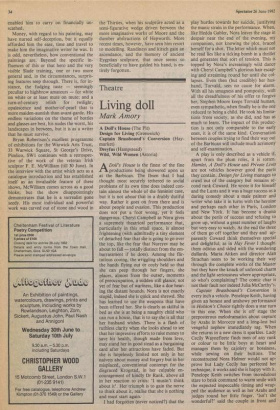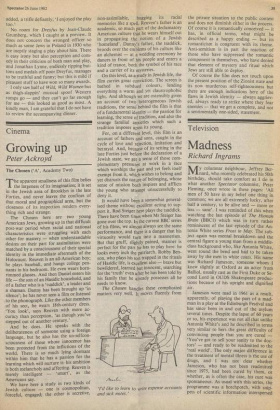Theatre
Living doll
Mark Amory
A Doll's House (The Pit)
Design for Living (Greenwich) Captain Brassbound 's Conversion (Hay-
market)
Dreyfus (Hampstead) Wild, Wild Women (Astoria) ADoll's House is the finest of the fine productions being showered upon us at the Barbican. The Ibsen that I had thought most securely tethered to social problems of its own time does indeed con- tain almost the whole of the feminist case, but it is not about that in a drably dutiful way. Rather it goes on from there and is about people and evasion. This production does not put a foot wrong, yet it feels dangerous. Cheryl Campbell as Nora gives a supremely theatrical performance that, particularly in this small space, is almost frightening (with admittedly a tiny element of detached fear that she is going to go over the top, like the fear that Nureyev may be about to fall — totally distinct from the em- barrassment if he does). Among the flir- tatious cooing, the wriggling shoulders and the hands flying out or coyly held so that she can peep through her fingers, she places, almost from the outset, moments of preoccupation, a sudden still glance, not yet of fear but of wariness, like a doe hear- ing the distant hounds. Nora is not exactly stupid, indeed she is quick and shrewd. She has learned to use the weapons that have been offered her. She is clearly as skilful in bed as she is at being a naughty child who can run a house, that is to say she is all that her husband wishes. There is a flash of ruthless clarity when she looks ahead to see that her impressive efforts to raise money to save his health, though made from love, may stand her in good stead as a bargaining card after her attractions have faded. But she is hopelessly limited not only in her naivety about money and forgery but in her misplaced, conventional contempt for the disgraced Krogstad, in her culpable en- couragement of kindly Dr Rank, above all in her reaction to crisis: 'I mustn't think about it'. Her triumph is to gain the nerve to think about it, realise that she is nothing and must start again.
I had forgotten (never noticed?) that the
play hurtles towards her suicide, justifying the manic strain in the performance. When, like Hedda Gabler, Nora leaves the stage in despair near the end of the evening, my companion, not knowing the plot, braced herself for a shot. The letter which must not be read lies like a ticking bomb in a thriller and generates that sort of tension. This is topped by Nora's increasingly wild dance with Cheryl Campbell's glorious hair escap- ing and streaming round her until she col- lapses. Even then (but credibly) her hus- band, Torvald, sees no cause for alarm. With all his smugness and pomposity, with all the dreadfulness of his offer to forgive her, Stephen Moore keeps Torvald human, even sympathetic, when finally he is the one reduced to being a child. He took his limita- tions from society, as she did, and has as much to learn. The impact of this produc- tion is not only comparable to the early ones, it is of the same kind. Conversation between couples trying to find their way out of the Barbican will include much acrimony and self-examination.
A play is only described as a vehicle if, apart from the plum roles, it is rotten. Hamlet, A Doll's House and Private Lives are not vehicles however good the parts they contain. Design for Living manages to crawl out of the category but remains se- cond rank Coward. He wrote it for himself and the Lunts and it was a huge success as a daring comedy about a male painter and writer who take it in turns with the heroine and perhaps each other in Paris, London and New York. It has become a drama about the perils of success and refusing to grow up, without a great number of laughs but very easy to watch. At the end the three of them go off together and they and ap- parently Coward think themselves special and delightful; as in Hay Fever I thought them odious and sided with the wondering dullards. Maria Aitken and director Alan Strachan seem to be working their way through the complete works of the Master but they have the knack of unforced charm and the light seriousness where appropriate, so who's complaining? The comic char is not their fault nor indeed Julia McCarthy's.
Captain Brassbound 's Conversion is every inch a vehicle. Penelope Keith, having given an honest and unshowy performance in Hobson 's Choice rightly does a star turn in this one. When she is off stage the preposterous melodramatics about capture by Arabs in Morocco and a long-lost but vengeful nephew immediately sag. When she returns in a new dress it sparkles. Lady Cecily Waynefleete finds men of any rank or colour to be little boys at heart and manages them by cajolery or bossiness, while sewing on their buttons. The reconstructed Nora Helmer would not ap- prove but Lady Cecily has perfected her technique, it works and she is happy with it. Penelope Keith switches from incredulous stare to brisk command to warm smile with the expected impeccable timing and wrap- ped the audience as well as her Arabs and judges round her little finger. 'Isn't she wonderful?' said the couple in front and
added, a trifle defiantly, 'I enjoyed the play too.'
No room for Dreyfus by Jean-Claude Grumberg, which I caught at a preview. It does not concern the wronged officer so much as some Jews in Poland in 1930 who are ineptly staging a play about him. There is easy irony but also perception and com- edy in their criticism of both man and play, and Jonathan Lynne, endlessly ripping but- tons and medals off poor Dreyfus, manages to be truthful and funny; but this is mild if pleasant stuff to have won so many awards.
I only saw half of Wild, Wild Women but as thigh-slappin' musical spoof Western romps go — and they can't go far enough for me — this looked as good as most. A kindly man, I am grateful that I do not have to review the accompanying dinner.























































 Previous page
Previous page